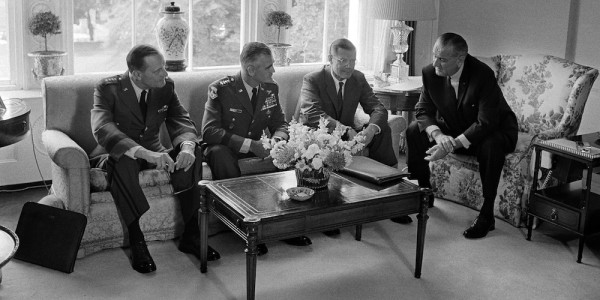

The top commander of U.S. military forces in Vietnam readied nuclear weapons for use on the battlefield in the early months of the brutal 1968 battle at Khe Sanh, according to recently declassified documents obtained by the New York Times.
- A series of memos, declassified in 2014 and first discovered by historian Michael Beschloss, reveals that Gen. William C. Westmoreland had in February 1968 activated Fracture Jaw, a secret plan to move nuclear warheads into South Vietnam “so that they could be used on short notice” should U.S. troops face imminent defeat at Khe Sanh.
- Westmoreland, who had previously touted the North Vietnamese advanced on Khe Sanh as “the main event” of the Communist advance, put Fracture Jaw together with the approval of the then-U.S. Pacific Command chief Adm. Ulysses S. Grant Sharp Jr. so that, “should the situation in the DMZ area change dramatically, we should be prepared to introduce weapons of greater effectiveness against massed forces.”
- President Lyndon B. Johnson quickly quashed the contingency plan out of fear of “a wider war,” the Times reports. “There are no nuclear weapons in South Vietnam,” White House national security advisory Walt W. Rostow wrote to Johnson in a February 10, 1968, memo alerting him to Fracture Jaw. “Presidential authority would be required to put them there.”
- The idea of throwing nukes into Vietnam wasn’t unprecedented, but it was still terrible. As the National Interest notes, a classified 1967 studyconducted by members of the Pentagon’s JASON brain trust of scientist and researchers had previously determined that a tactical nuclear bombing campaign in Southeast Asia would require a significant investment to ramp up bomb production with minimal impact on the war effort.
- More importantly, JASON researchers concluded that the introduction of nukes to Vietnam would have had dire long-term consequences on global warfare writ large. Historian Alex Wallerstein put it best: “Since World War II, the U.S. has the strongest interest in not breaking the ‘nuclear taboo’ because once nukes start becoming normalized, the U.S. usually stands to lose the most, or at least a lot.”
- President Johnson “certainly made serious mistakes in waging the Vietnam War,” Bechloss, the historian, told the Times. “But we have to thank him for making sure that there was no chance in early 1968 of that tragic conflict going nuclear.”
The entire report from the Times is fascinating — and eerily familiar. Read the whole thing here.
WATCH NEXT:
